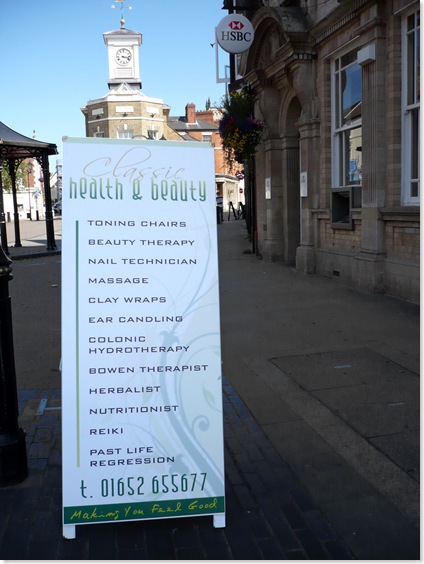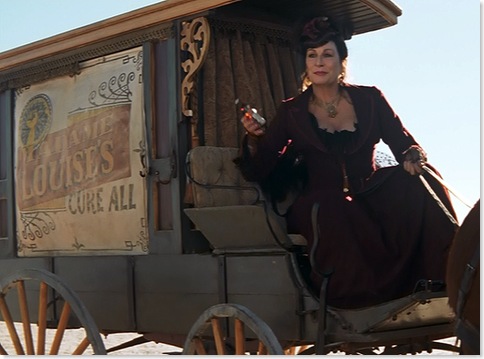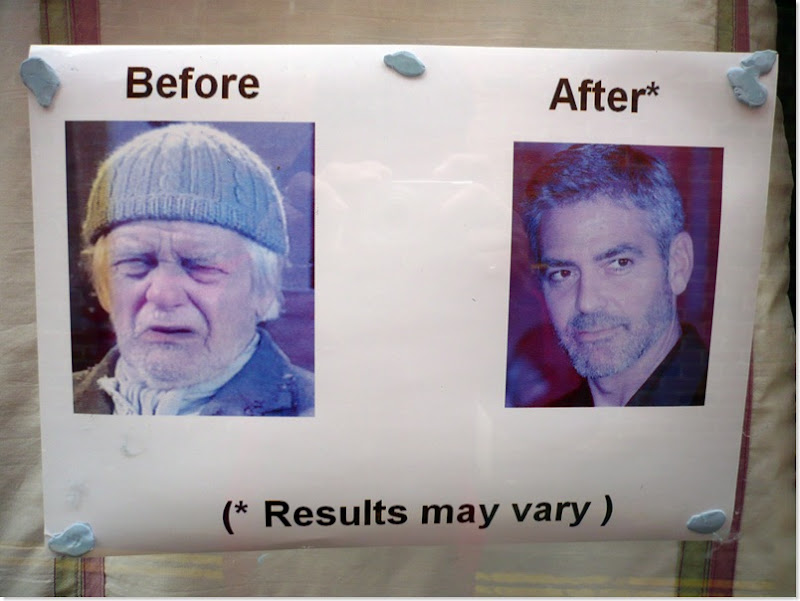Seen in a Barbers shop window in Whitby.
Friday, 29 August 2008
Thursday, 28 August 2008
Making You Feel Good: Snake oil peddling for Postmoderns
 Walking through Brigg at the beginning of the month I came across this advert for a health and beauty clinic. As a devotee of Ben Goldacre's superb Bad Science column in the Saturday edition of The Guardian I took more than a passing interest in what was on offer. You can make your own judgement as to the relative merits of this fascinating hotch potch of aids to 'health and beauty', but just note that seductive tag-line, "Making You Feel Good".
Walking through Brigg at the beginning of the month I came across this advert for a health and beauty clinic. As a devotee of Ben Goldacre's superb Bad Science column in the Saturday edition of The Guardian I took more than a passing interest in what was on offer. You can make your own judgement as to the relative merits of this fascinating hotch potch of aids to 'health and beauty', but just note that seductive tag-line, "Making You Feel Good".
Here, in all its shallow capitalist-consumerist glory, is Snake Oil peddling for Postmoderns. Let me be clear: whether or not these 'therapies' work is not the primary point for me; it is the peddling of 'feeling good' which I find troublesome. Correct me if I am wrong, but so far as I can tell much of the list has to do with transient feeling and the superficialities of appearance, rather than with deep, lasting well-being. I am left wondering what exactly is the good that is on offer here? Are the things listed temporary distractions from what we perceive to be not good about ourselves and our lives, or are they solutions of permanent transformative value? For the latter to be the case wouldn't the tag-line need to read "Making You Good", as feelings and perceptions are by their very nature prone to be fickle and impermanent? In terms of the advert, 'Good' is an individual quality, self-referenced and exclusive to the particular consumer. It has no apparent social connotation other than that of being beautiful in the eyes of others whose sole role is to confirm the individuals feeling of 'good'.
To sharpen my critique and give an example of what I am driving at, what are we to make of Past Life Regression? Is this the ultimate snake oil of feeling good by proxy? Fed up and disenchanted with your life, you are offered a succession of past alternatives to succour you and massage your ego. Is this the attraction here? But instead of Past Life Regression, what of This Life Progression, isn't this what most of us yearn for? We long for a quality of life which transcends quick-fix feelgood remedies, pleasurable though some of these experiences may undoubtedly be; a life in which happiness and fulfilment are characteristics of a healthy, well adjusted psyche and beauty is a quality of the human spirit, not looks. From where I sit this is not a good to be bought and sold, it is not a commodity which can be exploited in our capitalist market-driven economic system. That is why the tagline is 'Making You Feel Good'; becoming good within oneself takes work and is hard graft for the soul. You just can't buy it in a bottle. And of course it is a relational process too. It is about how our deepest values and our way of life are shaped so that goodness is understood within the context of the common good. So naturally enough for me my own sense of good is referenced back to Jesus and his Kingdom of God lifestyle and teaching. But I fear that here we hit a very contemporary problem.
 At the end of the western Seraphim Falls, Anjelica Huston has a marvellous cameo role as Snake Oil entrepreneur Madame Louise, purveyor of the Cure All potion. Without wishing to spoil the ending for those of you who haven't seen the movie, it will suffice here to say that she does not have the best interests of her clients at heart. Quite the opposite in fact. Her appearance presages anything but happiness and fulfilment for those who cross her path. My fear is that we in the church are increasingly seen and portrayed as peddling Snake Oil too. Much writing by militant atheists does just this. In the minds of such folk not only is what we offer bogus, our intentions are questionable too. We are no better than Madame Louise. Just as I walked past the advert in Brigg and questioned the ultimate value to our wellbeing of what I saw offered there, I know that so many in contemporary society look at our church buildings, noticeboards and posters with similar scepticism. This is a real challenge to Christians. The rediscovery of Kingdom of God lifestyles of radical love as being at the very heart of Christianity because the Kingdom of God values were what Jesus embodied, lived and taught is absolutely crucial here. It is a theme to which I return time and again on these pages.
At the end of the western Seraphim Falls, Anjelica Huston has a marvellous cameo role as Snake Oil entrepreneur Madame Louise, purveyor of the Cure All potion. Without wishing to spoil the ending for those of you who haven't seen the movie, it will suffice here to say that she does not have the best interests of her clients at heart. Quite the opposite in fact. Her appearance presages anything but happiness and fulfilment for those who cross her path. My fear is that we in the church are increasingly seen and portrayed as peddling Snake Oil too. Much writing by militant atheists does just this. In the minds of such folk not only is what we offer bogus, our intentions are questionable too. We are no better than Madame Louise. Just as I walked past the advert in Brigg and questioned the ultimate value to our wellbeing of what I saw offered there, I know that so many in contemporary society look at our church buildings, noticeboards and posters with similar scepticism. This is a real challenge to Christians. The rediscovery of Kingdom of God lifestyles of radical love as being at the very heart of Christianity because the Kingdom of God values were what Jesus embodied, lived and taught is absolutely crucial here. It is a theme to which I return time and again on these pages.
In 1986, the year that I entered training for the ministry at Wesley House, Cambridge, I read Richard MacKenna's newly published book God for Nothing:Is Religion Bad for You? This superb book is long out of print, so I will quote the Excursus from page 130 verbatim. It is all about 'Miracle Elixir'. Enjoy.
Once upon a time there was a faith-healer who travelled round the country curing people of various ills - coughs, colds, housemaids knee, and so forth. But the greatest impact he made was more because of what he was than what he did: he taught people to look at themselves and other people in a new way, to find treasure in the most unlikely places. After he left the country, people tried to work out how he could have made such an impression, and over a period of years they worked out a formula for a potion that they hoped would duplicate his effect. This was duly marketed as Miracle Elixir and over the years it became stupendously successful. A vast management team was built up, stringent copyrights and patents were issued, enormous offices, factories, shops and exhibition halls sprang up, and highly motivated salesmen were sent everywhere to sell the stuff. But as the years went by people began to forget what the Miracle Elixir was for: rival companies were set up using almost the same ingredients and claiming better effects.
Gradually, the public lost interest in the Miracle Elixir - and anyway it didn't seem to work so well as in the old days - but the company was too preoccupied with salesmanship and company traditions to ask itself what was going wrong. Instead they tried all sorts of gimmicks: exciting packaging, modernised instruction leaflet, testimonials from filmstars, musical bottles, singing salesmen, group discounts; they even extended the claims of the product by suggesting all sorts of new uses for it - cleaning carpets, washing hair, keeping teenagers off the streets, stopping girls getting pregnant. In fact, they tried everything they could think of to persuade people that the elixir could still be useful and fill a gap in their lives. What gap? Any gap! But sales still kept dropping and even the salesmen began to wonder if it was worth all the effort and if Miracle Elixir really worked at all; some just got depressed, but conscientious ones swallowed their doubts, redoubled their efforts and gladly went on every salesmanship course and conference the company could devise.
But one day in the director's boardroom, where some were old and some cynical and one or two of them, I'm afraid, were too busy enjoying the view from the top to have time even to taste the elixir, one day consternation reigned. The portrait of the founder, in top hat and tails, grasping in one hand a bottle of the elixir and in the other a copy of the formula, had been X-rayed before cleaning. Under the thick layers of paint and restoration by many different hands, the X-ray revealed the original painting - rather crude but vivid. There, under the overpainting of centuries, was not the suave, attractive gentleman with bottle and prescription, friend of royalty, TV celebrities and cabinet ministers, but a wild-eyed tinker with a curiously disconcerting smile, holding out his hands as if to embrace the viewer, not sell something to him. There was no bottle, no prescription - just a look of love and challenge.
The directors were horrified - what should they do? Restore the picture to the original? Destroy the X-ray? Call twenty-four hour board meetings? And how would all this affect sales? Can you have an organisation unless you are marketing something specific? Can you market a look in the eye?




